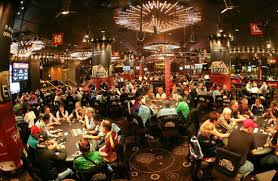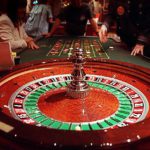I didn’t think I’d do another blog post for a few weeks, but I am learning so much about addiction — from gamblers! — I have to share it with you.
 Gambling really is a problem in Australia, and here’s what it looks like. The night before last I was walking around Melbourne, searching for a restaurant, when someone pointed me to the casino — a magnificent building with an enormous neon crown emblazoned on its glass and concrete exterior. The Crown Casino. I entered, past smiling security guards, and strolled down a central corridor infested with slot machines, one glittering gallery after another branching off it. Different rooms sported different games:
Gambling really is a problem in Australia, and here’s what it looks like. The night before last I was walking around Melbourne, searching for a restaurant, when someone pointed me to the casino — a magnificent building with an enormous neon crown emblazoned on its glass and concrete exterior. The Crown Casino. I entered, past smiling security guards, and strolled down a central corridor infested with slot machines, one glittering gallery after another branching off it. Different rooms sported different games:  roulette, baccarat, poker, some blackjack tables, but the most riveting signs above each table announced minimum bets per hand: $50, $100, $200, $500. Per hand! (at one point I located a $10 blackjack table and calmly surrendered my $50 stake.)
roulette, baccarat, poker, some blackjack tables, but the most riveting signs above each table announced minimum bets per hand: $50, $100, $200, $500. Per hand! (at one point I located a $10 blackjack table and calmly surrendered my $50 stake.)
The roulette and card tables weren’t really that interesting. Very rich, mostly Chinese people stood around throwing away tremendous amounts of money, not much moved either by winning or by losing.
But there were some roulette tables where one or two dowdy looking men stood, intently calculating. Just before each spin they would spread their chips in some intricate cabalistic pattern of numbered squares and  intersecting lines. And when the wheel slowed down and the white ball finally settled, it mattered. You’d either see a flash of triumph or else despair. And sometimes a protest:
intersecting lines. And when the wheel slowed down and the white ball finally settled, it mattered. You’d either see a flash of triumph or else despair. And sometimes a protest:
“Oh fuck, again?! You couldn’t do me a favour this once!” shouted one man, only slightly conspicuous by the sweat stains in his armpits.
And then he’d shovel another $50 or $100 at the dealer and get another pile of chips in return.
“Who was he angry at?” I asked the dealer, after the guy stormed away. “Is he angry at you?”
“I’m just doing my job,” the young man replied. He looked like he might be working his way through law school.
“Yeah, but they know that, right? And they know that whatever number comes up is completely random, right?”
“Sure, they know it, rationally they know it, but they still think they’ve figured out the pattern. And I don’t know why that guy was so mad. He won a thousand bucks in the last hour.”
I think his anger came from shame. Losing makes you a loser, especially when someone’s watching. But the most horrific sights in the casino were the slot machines. These high-tech electronic monsters are designed to instill a sense of triumph while you continue to lose your shirt. Men and women of all ethnicities and incomes sat there and hit one of a short row of buttons mindlessly, repeatedly, watching their net balance dwindle, roll by roll. But with occasional rebounds — accompanied by flashing lights, prancing cartoon nudes, and peppy  jingles. Only to continue their downward journey a moment later. I watched a middle-aged Eastern-European couple shovel bills into the slim mouth of the machine every few minutes and keep on playing. Did they actually think they would win? I asked them that. The man told me to go away.
jingles. Only to continue their downward journey a moment later. I watched a middle-aged Eastern-European couple shovel bills into the slim mouth of the machine every few minutes and keep on playing. Did they actually think they would win? I asked them that. The man told me to go away.
What was so spooky about this robotic ritual was the flatness of the facial expressions. The players hardly reacted to winning — or losing. Their expressions didn’t change. They just kept punching those buttons, every time the machine reset, which was every few seconds. And for them it mattered.
 Losers eventually have to give up. Then they go home and lie to their loved ones, take out another loan or ratchet up their credit card maximum, and come back to press that button again in a few more days. The only time you see emotion on their faces is when they finally stop, transfigured by despair and disgust.
Losers eventually have to give up. Then they go home and lie to their loved ones, take out another loan or ratchet up their credit card maximum, and come back to press that button again in a few more days. The only time you see emotion on their faces is when they finally stop, transfigured by despair and disgust.
Nobody has to tell you that gambling is addictive. It’s obvious. But here’s what I learned that night and in my readings and discussions since then:
First off, the compulsive slot-machine players looked exactly like end-stage drug addicts. People who snort or shoot up hour after hour or minute after minute. They’d display almost no pleasure. And then, when it was all gone, they’d go out to score, because that’s just the next step. I’m reminded of a guy  bedded in the cot next to mine in a cheap hippie hotel in Delhi, many years ago. This guy would rise up on his bed, reach down below for his carton of morphine ampoules, break the top off one of them, load it, shoot it, and then lie back down for almost exactly four hours. Until he started to twitch. Then he’d do it again.
bedded in the cot next to mine in a cheap hippie hotel in Delhi, many years ago. This guy would rise up on his bed, reach down below for his carton of morphine ampoules, break the top off one of them, load it, shoot it, and then lie back down for almost exactly four hours. Until he started to twitch. Then he’d do it again.
Maia Szalavitz calls it the hedonic treadmill. And it’s got everything to do with our standard biological computations. It’s about dopamine and reward prediction error. If the reward is the same or less than what was anticipated, the dopamine surge that came with anticipation drops back down to zero. With heroin, that takes place soon after you get the rush, the buzz…once you realize “oh this is all it is? — Now what?” With coke you get it in a few minutes, once you perceive that this little bump was merely a flash in the pan. False advertising. Ice-cream melting. But with gambling?! These folks lose almost every bet, and the bets they win are tiny.
So that’s the exaltation offered by gambling.
But then there’s the longer-term loss. The loss you feel when you get up after you’ve given up and look in your wallet (as if you had to) and realize that you lost it all.
Then there’s the blunting. I won’t get into that here, but addiction neuroscience is pretty clear that dopamine receptors thin out with all that action, so all rewards — both those provided by the addiction and those provided by pizza, sex, and playing with your dog — become flattened, diminished, boring. In which case, all you can do is to take bigger hits (more coke, more smack, or bigger bets at the tables) or else — finally, once you’ve had enough — quit. (Note that disease-model advocates conflate this effect with tolerance, which often rises in parallel though it’s not the same thing.)
And then there’s the really long-term loss: the loss of self-esteem. That’s the shame and mortification and self-disgust that shrouds you the way mist clings to the branches of a dying tree. That’s what gave rise to the rage of mister sweaty-armpits roulette player — anger borne of shame. That’s what gave rise to the despair shown by the couple with the Eastern-European accents as they staggered away from the slot machine, the machine that betrayed them.
Sound familiar?

Leave a Reply